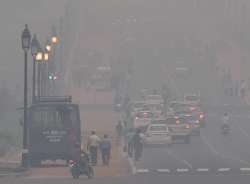Delhi smog: Rise in asthma, allergy, breathlessness cases; Kejriwal calls emergency cabinet meeting
Delhi is witnessing a sharp rise in the case of severe breathlessness, asthma and allergy have sharply risen as the city remains blanketed in thick layer of toxic air due to the worst smog in 17 years.

Delhi is witnessing a sharp rise in the case of severe breathlessness, asthma and allergy have sharply risen as the city remains blanketed in thick layer of toxic air due to the worst smog in 17 years.
Doctors and experts say that besides spike in fresh cases, health complications have aggravated in people having a history of asthma, allergy or other related ailments.
"Earlier 15-20 per cent pollution-related ailment cases were reported at our hospital. But now these have gone up to 60 per cent.
"The most common problem is related to respiration. But this time we are seeing a rather large number of cases of severe breathlessness, coughing and sneezing and bronchiolitis due to the smog," says Dr S P Byotra, senior consultant and chairman of the department of medicine at Sir Ganga Ram Hospital (SGRH).
Bronchiolitis is inflammation of the bronchioles, the smallest air passages of the lungs.
"Children and elderly are the most vulnerable to infections and allergies due to smog and pollution. So, they should take extra care, and try not to venture during early morning and at dusk when the toxic level is highest," Byotra says.
A thick shroud of menacing grey haze blanketed the national capital yesterday even as pollution level breached the safe limit by over 17 times at places, prompting Chief Minister Arvind Kerjriwal to also describe Delhi as a "gas chamber".
Kejriwal cited smoke from farm fires in Punjab and Haryana as the main reason for pollution. He appealed to people to minimise the use of private vehicles in view of the situation and switch to public transportation facilities.
The Chief Minister has called for an emergency cabinet meeting at noon today.
Kejriwal met Environment Minister Anil Dave yesterday and sought Centre's urgent intervention to deal with the challenge.
Dave termed it an "emergency situation" and called a meeting of environment ministers of all neighbouring states tomorrow to curb stubble burning by farmers.
"There is an emergency situation in Delhi. The situation is bad, particularly for children, patients, women and elderly. We need to take immediate steps to deal with the situation," Dave told reporters, adding he was also exploring the possbility to call a meeting of chief ministers of all neighbouring states on the issue.
According to experts, it is estimated that over 20 per cent of the world's population suffers from allergic diseases such as allergic asthma, allergic rhinitis and allergic conjunctivitis, atopic eczema and anaphylaxis.
"We are seeing a rise of 60-70 per cent in ailment cases related to pollution. Breathlessness, asthma, eye and skin allergies case have jumped. We are getting patients as young as a two-month-old baby who had bronchiolitis.
"People who had a history of or are predisposed to such ailments, such cases have also risen. Children getting affected more, as their immunological state is low. Besides, the infections are taking longer time to subside," says Dr Rahul Nagpal, Director and Head, Pediatrics, at Fortis Hospital in Vasant Kunj.
"Children should as far as possible avoid venturing out in the open early morning and late evening, and peak hours of the pollution. The number of cases have increased due to the smog in the last few days," says Dr V K Paul, pediatrician at AIIMS.
Cases of asthma and allergy have also doubled at Apollo Hospital in south Delhi, with doctors saying cases of coughing, sneezing, and eye and skin allergy on the rise in the wake of thick smog that has engulfed the city for past few days.
"The incidences have surely risen, and in many ailments it has doubled almost. Asthma, allergy and other ailments triggered by pollution have increased and it is the elderly, who are suffering the most," consultant (internal medicine) at Indraprastha Apollo Hospital, Dr Suranjit Chatterjee says.
"Vehicular pollution is a major factor and it is my view that private vehicles should be limited and people should take up public transport more. The vehicles should have compliance with international green norms, but more than that we need sustained efforts to address this issue," Chatterjee says.
Nearly 17,000 schools running under the three municipal corporations of Delhi were yesterday closed in view of the heavy smog and pollution.
Asthma is a worldwide problem, with estimated 300 million affected individuals and global prevalence which ranges from 1-18 per cent in different geographical regions.
Air pollution is killing nearly eight lakh people annually in the South East Asian Region with India alone accounting for over 75 per cent of the casualties caused by cardiovascular diseases and lung cancer, according to WHO.
According to a recent WHO report, a few Indian cities, including Delhi, Patna and Gwalior were identified as among the severely polluted cities in the world. Experts say global warming and pollution are among the major factors responsible for causing allergic ailments.
(With PTI inputs)